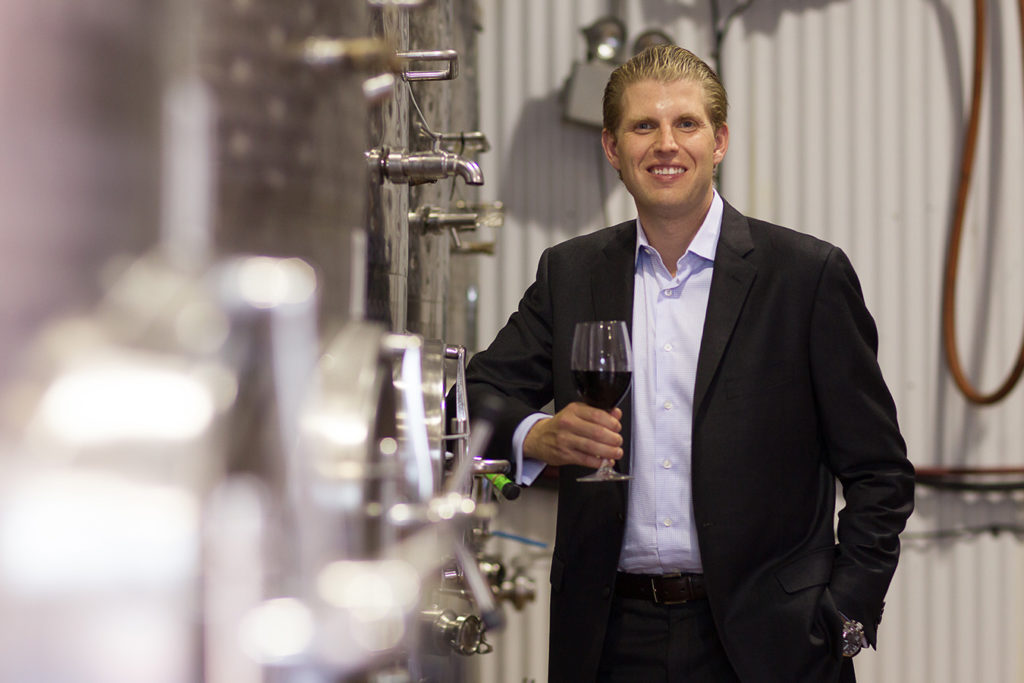Maybe It’s Because His
Dad Is Threatening to Slap a Big, New Tariff on French Wines
By
Dana Kennedy
 |
| Eric "Fredo" Trump holding glass of what one wine critic called "Welch's Grape Jelly with alcohol." |
No one inside the lush
halls of the Miraval winery, co-owned by Angelina Jolie and Brad Pitt with
a French partner and located in Provence, wanted to answer that question this
week. But the French receptionist who picked up the phone kept laughing. “C’est
amusant,” she said.
What was so funny?
The international catfight—call it the wine wars—between President
Donald Trump and French President Emmanuel Macron that’s erupted over a new 3%
tax to be levied on the revenues earned by big U.S. digital companies in
France.
Trump was furious by
France’s so-called GAFA high-tech tax and retaliated by threatening to impose
tariffs on French wine, which he called inferior to the American brand.
Trump was furious—or
at least he pretended to be—by the so-called GAFA (stands for Google, Amazon,
Facebook and Apple) tax and retaliated by threatening to impose tariffs on
French wine which he called inferior to the American brand.
The U.S. has also
launched a Section 301 investigation into France’s new digital tax,
marking a new low in Franco-American relations.
“They shouldn’t have
done this,” Trump said. “I told them, I said, ‘Don’t do it because if you do
it, I’m going to tax your wine.'”
He added, “I’ve always
liked American wines better than French wines—even though I don’t drink wine.”
Trump called Macron
out for his “foolishness” in enacting the tax and the French Agricultural
Minister Didier Guillaume fired back on local TV a few days later.
“It’s absurd, in terms
of having a political and economic debate, to say that if you tax the ‘GAFAs’,
I’ll tax wine. It’s completely moronic,” Guillaume told BFM TV. “American wine
is not better than French wine,” he added.
‘Grape Jelly’
 |
| Stay away from the white! |
It’s unlikely, then,
that Trump wine will get a boost over French wines like the Jolie-Pitt Miraval
rosé, a shock bestseller in the U.S. since it was rolled out in 2012 and now
consistently ranked one of the best wines in the world.
“French wine is sold
as a premium,” said Rémi Bourgeot, an economist at IRIS, the French Institute
for International and Strategic Affairs. “Even if Trump targets it, he won’t
have that much of an impact. People aren’t going to stop buying French wine.”
A Smokescreen
Bourgeot said that the
wine kerfuffle may actually be a smokescreen for Trump’s more overarching
ambitions in his trade wars with Europe.
For one thing, Trump
has no right to be angry at Macron. America’s Big Tech gets away with
information highway robbery in countries like France.
They avoid paying the same taxes as local companies via complicated, shady-sounding schemes that European economists like to call “financial engineering” but which are all legal, thanks to the European Union’s lack of a unified tax code.
They avoid paying the same taxes as local companies via complicated, shady-sounding schemes that European economists like to call “financial engineering” but which are all legal, thanks to the European Union’s lack of a unified tax code.
Certain countries,
notably Luxembourg and Ireland, offer bargain corporate taxes of between 10%
and 14% to woo big US digital and multinational companies.
Facebook,
Google, Apple and Airbnb, among others, have their European headquarters in
Dublin or Cork. Since 2003, Amazon Europe has been based in Luxembourg, once
called the “financial secrecy death star” by the Tax Justice
Network. So Amazon gets to sell products in France, but it avoids the roughly
32% French corporate income tax by going through Luxembourg.
Trump knows this, said
Bourgeot, who believes his real goal is to force the EU to reduce the German trade surplus and lower trade barriers between the
U.S. and Europe.
“The real issue is the
German trade surplus, especially German cars,” Bourgeot said.
“It’s caused a big imbalance in Europe but every time Trump criticizes the Germans, Macron defends them. So now he’s leaning on Macron by threatening a wine tax over GAFA. This is all very tit for tat trade bargaining. Trump’s base may applaud him for taxing French wine but he’s got ulterior motives. He’s been focusing on China but those of us in Europe knew we were next in line.”
“It’s caused a big imbalance in Europe but every time Trump criticizes the Germans, Macron defends them. So now he’s leaning on Macron by threatening a wine tax over GAFA. This is all very tit for tat trade bargaining. Trump’s base may applaud him for taxing French wine but he’s got ulterior motives. He’s been focusing on China but those of us in Europe knew we were next in line.”